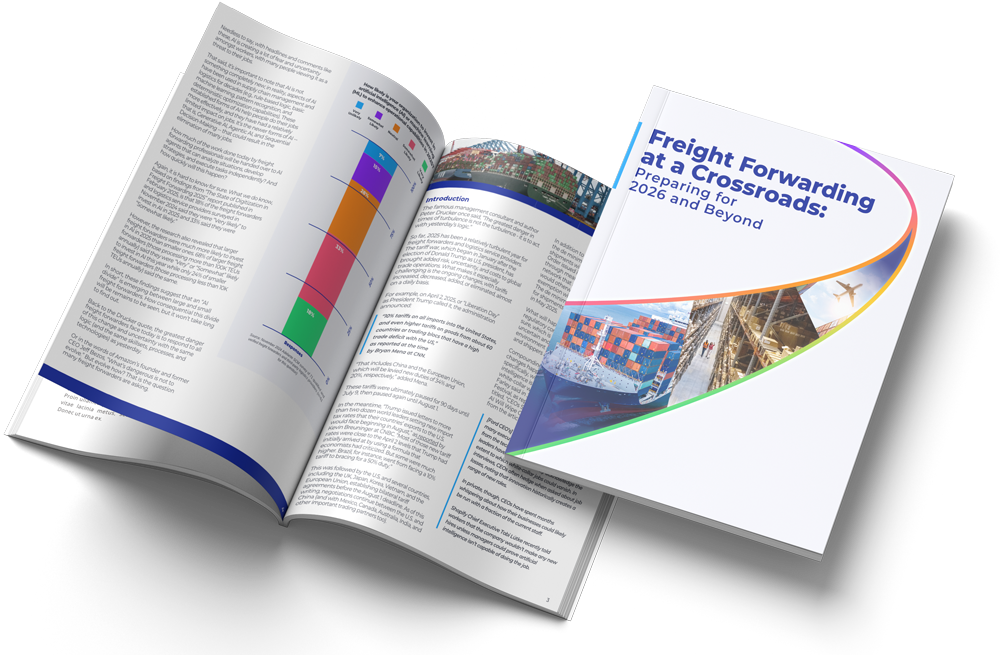Freight Forwarding at a Crossroads: Preparing for 2026 and Beyond
Are you ready for what's next? Research conducted by independent firm Adelante SCM, sponsored by Magaya, illuminates widening gaps in AI readiness, technology investment, and customer satisfaction, making a fresh strategic approach essential.
This 13-page report explores these results and uncovers the strategic bets LSPs are placing in order to succeed in 2026 and beyond.
Please complete the form for instant access to the report.

Executive Summary
The greatest risk in this moment isn’t the turbulence of the market itself; it’s staying still.
Thus, future growth calls for a fresh approach, especially when the pace of change continues to accelerate with even higher rates of unpredictability.
This is on top of the other pressures freight forwarders are facing, seemingly from every direction, like volatile trade policy, surging customer expectations, and a new wave of automation powered by AI.
This report highlights the fresh approach the most resilient and successful forwarders are adopting in 2026 and beyond:
- Embracing automation for efficiency and compliance
- Investing in practical modernization
- Closing the AI understanding gap
- Balancing transformation with human connection and trust
Key Findings
45% of forwarders are automating documentation, compliance, and invoicing workflows, however, there was a sizeable gap between large and small forwarders who say that they have “No major modernization initiatives at this time” compared to larger ones (20% vs. 6%).
48% of respondents cite “lack of internal AI expertise” as the top barrier to adoption, highlighting a need for new approaches to hiring and training.
90% of respondents rank trusted relationships as their #1 success driver, especially among small forwarders (97%), an interesting paradox considering the parallel push for digitization. The challenge will be in using technology to elevate human experiences, not replace them.
Our research reveals a widening gap between those who are adapting with clear strategic bets and those falling behind. The divide between large and small forwarders is growing, especially in AI readiness, tech investment, and customer satisfaction.
Introduction
The famous management consultant and author Peter Drucker once said, “The greatest danger in times of turbulence is not the turbulence - it is to act with yesterday’s logic.”
So far, 2025 has been a relatively turbulent year for freight forwarders and logistics service providers. The tariff war, which began in January after the election of Donald Trump as U.S. president, has brought added risk, uncertainty, and costs to global trade operations. What makes it especially challenging is the ongoing changes, with tariffs increased, decreased, added, or eliminated, almost on a daily basis.
For example, on April 2, 2025, or “Liberation Day” as President Trump called it, the administration announced “10% tariffs on all imports into the United States, and even higher tariffs on goods from about 60 countries or trading blocs that have a high trade deficit with the US,” as reported at the time by Bryan Mena at CNN. “That includes China and the European Union, which will be levied new duties of 34% and 20%, respectively.”
These tariffs were ultimately paused for 90 days until July 9, then paused again until August 1.
In the meantime, “Trump issued letters to more than two dozen world leaders setting new import tax rates that their countries’ exports to the U.S. would face beginning in August,” as reported by Kevin Breuninger at CNBC. “Most of those new tariff rates were close to the April 2 levels that Trump had initially arrived at by using a formula that economists had criticized. But some were much higher. Brazil, for instance, went from facing a 10% tariff to bracing for a 50% duty.”
This was followed by the U.S. and several countries, including the UK, Japan, Korea, Vietnam, and the European Union, establishing bilateral tariff agreements before the August 1 deadline. As of this writing, negotiations continue between the U.S. and China (and with Mexico, Canada, Australia, India, and other important trading partners too).
Download Now to Read More
Please complete the form for instant access to the report.
 About the Author
About the Author
Adrian Gonzalez, President of Adelante SCM and Host of Talking Logistics
For over 25 years, trusted supply chain and logistics analyst, Adrian Gonzalez, has served as a strategic advisor to top executives across manufacturing, retail, third-party logistics, and technology sectors.
Adrian is the founder and host of Talking Logistics (www.talkinglogistics.com), a video talk show where industry thought leaders and newsmakers share insights and discuss critical topics shaping the supply chain and logistics landscape.
As the founder of Indago (www.joinindago.com), he leads a market research community of supply chain practitioners dedicated to exchanging practical knowledge and advice in a confidential, trusted space while supporting charitable causes that make a difference.
Through Adelante SCM, Adrian empowers young supply chain professionals to connect, share expertise, and grow within a private, solicitation-free environment.
A former adjunct instructor of Supply Chain Management at Northeastern University’s Executive MBA program, he is also an accomplished public speaker and writer with a knack for sparking meaningful conversations and delivering actionable insights.